Professor Anne Summers recommends these important national surveys, reports and books.

National surveys
Notes on Longitudinal Data Concerning Domestic Violence
This summary paper, written by Professor Bruce Chapman, outlines the advantages of using longitudinal data to study domestic violence.
Australian Bureau of Statistics Personal Safety Survey
The 2016 edition of the federal government’s regular nationwide household survey of violence includes a main focus on domestic violence of all types.
The survey presents statistics for family, domestic, sexual violence, physical assault, partner emotional abuse, child abuse, sexual harassment, stalking and safety.
National Community Attitudes Towards Violence Against Women Survey (NCAS)
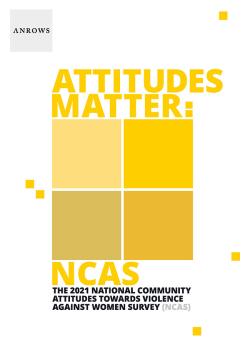
An important marker on how community attitudes are changing – or not.
The latest survey, conducted by Australia’s National Research Organisation on Women’s Safety contains some distressing evidence that tolerance for domestic violence is growing and that belief in women’s stories is falling.
From the survey website: The NCAS is the world’s longest-running population-level survey of community attitudes towards violence against women. The NCAS tells us how people understand violence against women, their attitudes towards it, and if there has been a change over time. It also gauges attitudes to gender inequality and people’s preparedness to intervene when witnessing abuse or disrespect towards women. The findings are drawn from interviews with a representative sample of 19,100 Australians aged 16 years or over.
Reports
The importance of annual data
This note, written by Dr Kristen Sobeck, demonstrates why annual longitudinal data are important for accurately measuring the dynamics and impacts of domestic violence, showing how less frequent data collection can obscure critical changes in people’s lives.
Identifying domestic violence victim-survivors and perpetrators using administrative data
This report—written by Dr Karinna Saxby, Thomas Shortridge and Dr Kristen Sobeck—reviews international approaches to identifying domestic violence victim-survivors and perpetrators using administrative data. It also examines current and emerging Australian administrative data assets and their potential for research on domestic violence.
National Plan to End Violence against Women and Children 2022-2023: Ending gender-based violence in one generation
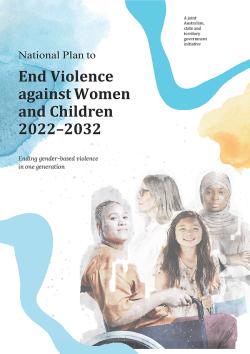
by the Department of Social Services, Commonwealth of Australia
The National Plan to End Violence Against Women and Children is a joint Australian state and territory government initiative
An excerpt from the National Plan's vision: This National Plan is our commitment to a country free of gender-based violence – where all people live free from fear and violence and are safe at home, at work, at school, in the community and online. This is a human right for all people and we commit to ending violence against women and children in Australia in one generation.
Violence against women and children is a problem of epidemic proportions in Australia. One in 3 women has experienced physical violence since the age of 15, and one in 5 has experienced sexual violence. On average, a woman is killed by an intimate partner every 10 days. Rates of violence are even higher for certain groups, such as Aboriginal and Torres Strait Islander women. A woman is also more likely to experience violence at particular life stages, such as while pregnant or while separating from a relationship. In 2021, girls aged 10 to 17 made up 42% of female sexual assault victims.
The cost of financial abuse in Australia 2022
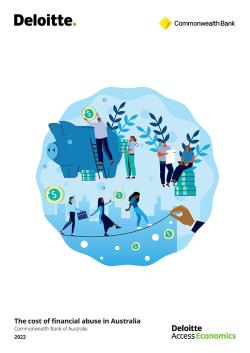
by Deloitte Access Economics and Commonwealth Bank of Australia
From the executive summary: Over 623,000 women and men were subjected to financial abuse by a current or former intimate partner across Australia in 2020 alone. The impacts of financial abuse incurred an estimated $5.7 billion in direct costs for victims and $5.2 billion in costs for the broader economy in 2020
Financial (or economic) abuse is widespread throughout Australian society and creates a range of serious costs for both victims and the broader economy. While most Australians recognise other aspects of domestic and family violence (DFV), such as physical and sexual abuse, fewer are aware of the prevalence and impacts of financial abuse.
The Commonwealth Bank of Australia (CommBank) is committed to addressing financial abuse and assisting customers to achieve financial independence. ...
In this context, Deloitte Access Economics was engaged to study the prevalence and costs of financial abuse in Australia in 2020. This analysis should contribute to building the evidence base of the costs of financial abuse in Australia – and helping to raise public awareness on the issue to improve the response.
Books
No Visible Bruises: What We Don’t Know About Domestic Violence Can Kill Us
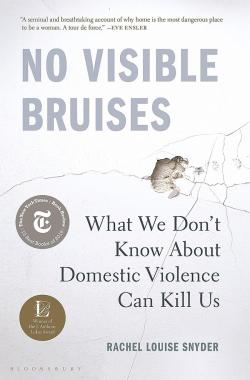
by Rachel Louise Snyder (Bloomsbury 2019)
From the publisher's description: An award-winning journalist's intimate investigation of the true scope of domestic violence, revealing how the roots of America's most pressing social crises are buried in abuse that happens behind closed doors.
We call it domestic violence. We call it private violence. Sometimes we call it intimate terrorism. But whatever we call it, we generally do not believe it has anything at all to do with us, despite the World Health Organisation deeming it a “global epidemic”. In America, domestic violence accounts for 15 per cent of all violent crime, and yet it remains locked in silence, even as its tendrils reach unseen into so many of our most pressing national issues, from our economy to our education system, from mass shootings to mass incarceration to #MeToo. We still have not taken the true measure of this problem.
In No Visible Bruises, journalist Rachel Louise Snyder gives context for what we don't know we're seeing. She frames this urgent and immersive account of the scale of domestic violence in our country around key stories that explode the common myths-that if things were bad enough, victims would just leave; that a violent person cannot become nonviolent; that shelter is an adequate response; and most insidiously that violence inside the home is a private matter, sealed from the public sphere and disconnected from other forms of violence. Through the stories of victims, perpetrators, law enforcement, and reform movements from across the country, Snyder explores the real roots of private violence, its far-reaching consequences for society, and what it will take to truly address it.
See What You Made Me Do: Power Control and Domestic Abuse

by Jess Hill (Black Inc. 2019)
From the publisher's description: A searing investigation that challenges everything you thought you knew about domestic abuse
Domestic abuse is a national emergency: one in four Australian women has experienced violence from a man she was intimate with. But too often we ask the wrong question: why didn’t she leave? We should be asking: why did he do it?
Investigative journalist Jess Hill puts perpetrators – and the systems that enable them – in the spotlight. See What You Made Me Do is a deep dive into the abuse so many women and children experience – abuse that is often reinforced by the justice system they trust to protect them. Critically, it shows that we can drastically reduce domestic violence – not in generations to come, but today.
Combining forensic research with riveting storytelling, See What You Made Me Do radically rethinks how to confront the national crisis of fear and abuse in our homes.
Truth and Repair: How Trauma Survivors Envision Justice
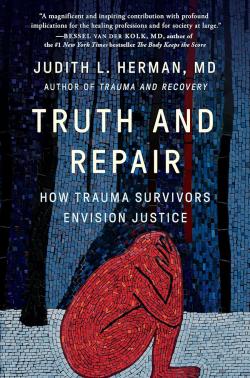
by Judith. L. Herman MD (Basic Books 2023)
From the publisher's description: A powerful exploration of what justice truly means for survivors of sexual violence, abuse, and trauma.
Part manifesto, part exploration of what justice truly means for survivors of trauma and abuse, Judith Herman forces us to reconsider our perspective on victims, revealing uncomfortable truths about our justice systems and proposing new ways to implement justice. A follow-up to the bestselling Trauma and Recovery the book is divided into three parts, Part One: Power, examines the structure and nature of tyranny, patriarchy and white supremacy; Part Two: Visions of Justice, reveals how our current system is woefully ill-equipped for victims and corrects our misguided assumptions about what survivors need in the aftermath of violence, and finally in Part Three: Centring Survivor Justice, Herman proposes alternative methods of justice, offering hopeful new ways to think about its meanings and possibilities.
Truth and Repair is a profound and timely commentary that lies at the intersection of several cultural moments including the #MeToo movement, a resurgent interest in trauma, and the global movements focusing on racial injustices and abuses of power towards people of colour. Thoughtful, visceral and moving, Truth and Repair is a necessary call to action that invites us to envision a new approach to justice-one that centres on healing and solidarity to stand with survivors everywhere.

Contact us : BusinessResearchOffice@uts.edu.au
Find out more : Our research ~ news ~ events ~ key resources

